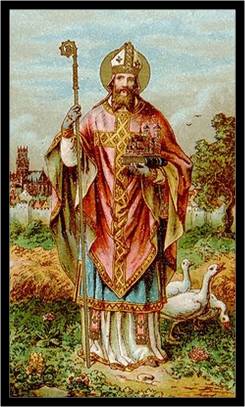MARCH 26 - ST. LUDGER

St. Ludger was born at Zuilen, Friesland (modern Nederlands) in northern Europe. His parents Thiadgrim and Liafburg were rich Frisian nobles and his brothers Gerburgis and Hildegrin also became saints.
When he was a young boy, he heard St. Boniface preach and his words touched Ludger’s heart. Ludger studied hard for many years in England and became a priest.
He then returned to the Netherlands as a missionary and began to travel far and wide preaching the Good News. He was very happy to share all that he had learned about God with everyone who listened to him. Pagans (people who didn’t believe in God) were converted and Christians began to live much better lives. St. Ludger built many churches and monasteries.
Then suddenly barbarians called Saxons attacked his land and drove the priests out. It seemed as though all St. Ludger’s work would be lost. But he would not give up. He first found a safe place for his disciples. Then he went to Rome to ask the Holy Father, Pope Adrian I, what he should do.
For over three years, Ludger lived in the Benedictine monastery as a good, holy monk. But he did not forget his people at home. Then King Charlemagne requested him to return to his country and Ludger returned and continued his work. He worked very hard to bring the good news of Jesus to people and many of the pagan Saxons became Christians.
When he was made a bishop, Ludger gave an even better example by his great kindness and piety. Once, jealous men spoke against him to King Charlemagne saying that he was spending more money on charity than on church decoration. The king ordered him to come to court to defend himself. Ludger went obediently to the castle.
The next day, when the king sent for him, Ludger said he would come as soon as he had finished his prayers. This made the king angry. But St. Ludger explained that although he had great respect for the king, he knew that God came first. “Your Majesty will not be angry with me,” he said, “for you yourself have told me always to put God first.”
The king could not find fault with such a wise answer and loved and admired the holy Bishop very much. No matter how busy he was, Ludger never gave up his time of prayer or meditation.
St. Ludger died after celebrating two Masses on Passion Sunday in 809. He performed his duties in the service of God even on the day he died.
